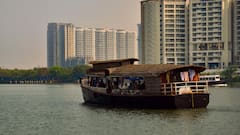Sustainable Travelling: What Is Sustainable Travelling And How To Practice It
It is often said that when travellers visit a destination, it has an impact on it. Unfortunately, more often than not, the impact is quite negative.

New Delhi: Travellers had been caught off guard for a time by the COVID-19 pandemic, but now that things are getting back to normal and it is possible to travel internationally once again, people are eager to go on the road once more. Travelling now has both good and bad effects. Yes, travelling and exploring new places may be exciting, but it's also necessary for every one of us to act responsibly. Travelling should involve more than simply having a wonderful time; we should also take excellent care of the environment and the place we're visiting.
It is often said that when travellers visit a destination, it has an impact on it. Unfortunately, more often than not, the impact is quite negative. At Mount Everest, climbers are infamous for leaving rubbish behind. According to National Geographic, the Nepali authorities removed 11 tonnes of rubbish from Mount Everest in 2019. Spain's Mallorca Island has a freshwater deficit during the summer tourist season. While this is going on, visitors are busy taking lengthy showers, hotels are washing their linens every day, and resorts are watering their beautifully planted, lush lawns.
Travelling with an eco-friendly mindset might contribute in the preservation of natural and cultural treasures, ensuring their survival for future generations.
What is sustainable travelling?
Sustainable tourism places an emphasis on reducing the negative consequences of travel and emphasising its potential benefits. Every time we travel, we have the opportunity to make a positive difference in a variety of ways, foremost among them being the promotion of tourism, which brings in money, supports the local economy by generating new employment, and the preservation of natural regions.
We may also have a negative impact on the place we travel to. We sometimes make our surroundings dirty by scattering garbage around or waste energy by turning on lights and air-conditioners when we don't need to, just because we don't have to pay more for the electricity we use in our hotel rooms. We occasionally even squander a lot of water when taking a shower or perhaps for other purposes just because it's free. All of them have a detrimental effect on the surroundings and the location we are visiting.
Thus, achieving a balance between economic development, human welfare, and environmental protection is the key to sustainable tourism. It focuses on minimising tourism's negative effects and boosting its beneficial effects on ecosystems, people, cultures, and the environment. Both the immediate effects on the present and the longer-term effects on future generations are taken into account in sustainable tourism.
The need for sustainable travel:
Learning to travel logically is crucial, from packing your essentials before leaving to arriving home once your trip is finished. Since it is crucial for travellers to protect the surroundings and environment of the location they are visiting, there is a rising need to raise awareness about sustainable travel. Not only that, but it's also important to take care of the locals and avoid making their lives unpleasant. Therefore, it's crucial to exercise caution while travelling so that other people can also visit the location in the future.
Authorities may decide to close down sites if sustainable tourism does not become the norm. Following coral reef damage caused by beachgoers, Thailand temporarily closed Maya Beach on Phi Phi Island. In other instances, the solution is offered after the damage has already been done by visitors. In Lisbon's Rossio Railway Station, a visitor climbed a monument of King Dom Sebastian for a selfie. Due to this, the statue from the 16th century fell to the ground and broke.
How governments are trying to ensure sustainable travel?
Through policy, governments may promote sustainable travel. The boat firms in Bruges, Belgium, have been encouraged to switch to electric engines. In this way, they can reduce the noise and pollution they produce when giving tours of the famous canals of the city. More contentiously, trophy hunting proceeds are donated to conservation initiatives by African wildlife parks.
Legislation to safeguard cultural and natural resources is still lacking in many places. Travelers and service suppliers are now on the hook for acting sustainably. The simplest method for travellers to conserve and safeguard the attractions they love is to simply think about the implications of their travel decisions.
The ways by which people can travel sustainably:
Conservation of nature- We can explore some of the most breathtaking natural wonders and diverse ecosystems in our world by travelling. Our natural environment offers a wealth of options for exploration, from colourful coral reefs and lush rainforests to snowy vistas and towering mountain summits.
Tourism has the unique capacity to encourage environmental responsibility and conservation because it allows people to interact with nature. However, unsustainable tourism can have the opposite impact and wreak havoc on the landscapes it depends on. We must be careful to limit our negative effects and safeguard the delicate ecosystems we visit if we wish to maintain the natural places that inspire us.
We can do so simply by being a little more environment conscious and not throwing trash around, or dirty the water bodies, etc. We must also follow the rules and regulations while visiting national parks and protected areas.
Dealing with climate change- Global warming is a result of the excessive greenhouse gas emissions that are negatively affecting the climate throughout the world. Eventually, the polar ice caps have begun to melt, raising the earth's sea level. We are continually looking for ways to use alternative energy sources and reduce carbon dioxide emissions. Although airplanes generate a significant amount of carbon dioxide emissions, it is unavoidable if we need to go to distant locations. Thus, to make up for it, we can reduce the carbon footprint generated by planting more trees or creating wind farms to generate wind energy. When feasible, we should use bicycles or share automobiles to reduce our carbon dioxide emissions.
Controlling pollution: Due to its tendency for overconsumption, the tourist sector generates a sizable quantity of trash and pollution. Due to the tremendous pressure, this causes, sewage treatment facilities and landfills may overflow. The inappropriate dumping of trash, raw sewage, and harmful chemicals by travellers, hotels, cruise ships, and other entities is a significant problem. This garbage and pollution may harm locals and animals in addition to detracting from the allure of locations.
Travellers may use the same conservation practices that they do at home to preserve their locations pristine: They can turn off the lights and fans when not in use. Tourists should also turn down the heater or the air conditioners, or switch them off when not required. They may avoid using single-use plastics like PET water bottles. While purchasing something from the local markets, tourists may carry their own bags and avoid asking for polythene bags to carry their stuff.
Thus, " Travel gets us up close to some of the world's most beautiful natural treasures and links us with civilizations all around the world. It also has the capacity to transform places and people's lives - for the better or for the worst. "






































